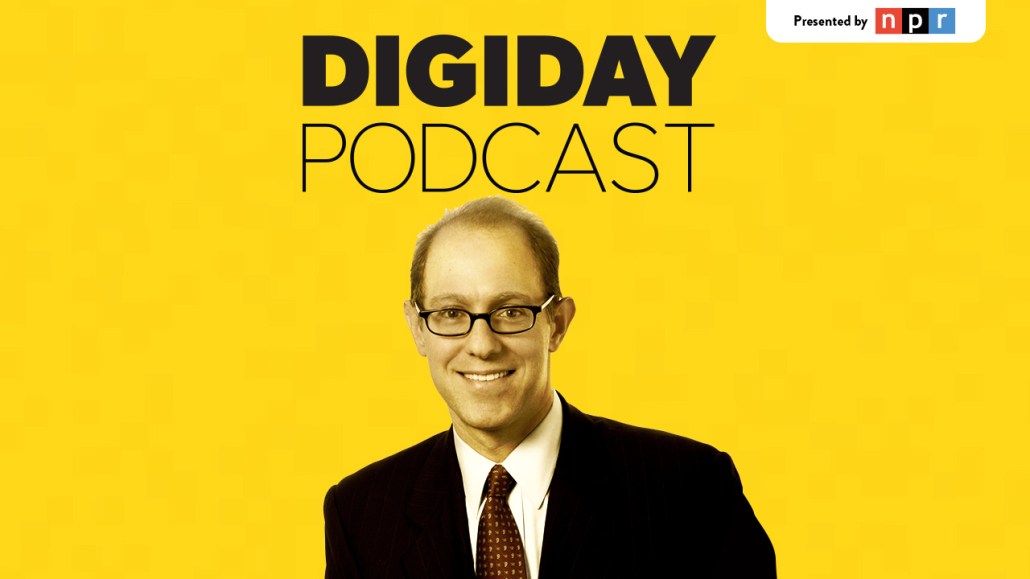Secure your place at the Digiday Publishing Summit in Vail, March 23-25
CoinDesk’s Kevin Worth: In the GDPR era, crypto may help publishers rethink audience and revenue

Subscribe: iTunes | Google Play | Stitcher | Anchor
Bitcoin is celebrating its 10-year anniversary in 2018 during a time when the space of cryptocurrency remains to be an unchartered territory in need of some clarity and regularity. But Kevin Worth, CEO of CoinDesk and former Bloomberg executive, says the use cases for crypto extend beyond illicit activities.
“The Basic Attention Token is an interesting way of thinking about the relationship between publishers, readers and advertisers, which tries to move away from the online ad model,” said Worth of this week’s Digiday Podcast. “In the era of GDPR, it forces publishers to rethink. We’re interested in seeing Civil succeed. It’s trying to rethink paying for quality journalism. I don’t think there’s something for 2019 that’s completely going to disrupt media but there are a lot of projects worth keeping an eye on.”
Promise aside, there is still a lot of infrastructure and regulatory framework needed around crypto for it to become a reliable space. Worth discusses CoinDesk, a publication focused on covering cryptocurrency, how they approach the coverage of this space and where the road lies ahead. Edited highlights below.
Scaling CoinDesk.
“We’ve been scaling the company editorially. We’ve taken the original idea on which CoinDesk was founded. We’ve hired a lot of journalists in different time zones and different beats. We’re trying to be the paper record in a very thoughtful, journalistic way. Crypto and blockchain [are thought of] as two separate worlds. We cover them both but we cover far more than that. The narrative of price going up and down is a side show. What we’re doing every day is trying to chronicle the people who are building the scaffolding of this decentralized internet, both on the corporate and entrepreneurial sides. That narrative has a long road ahead of it.”
What’s the target audience?
“The ethos that binds everyone [who reads CoinDesk] together is the idea of the decentralized internet. The founders of the internet probably didn’t imagine these enormous choke points in the internet. It was meant to be a more democratized way of spreading information and doing commerce. We are [a B2B company]. Our coverage and events are geared towards stakeholders in the industry. But we also see a lot of crypto-curious come by.”
CoinDesk won’t feel the impact of a crypto shakeout.
“Wall St is looking at this space and ask if crypto is a new asset class like commodities or stocks. A lot of these firms are thinking about what infrastructure and compliance is needed and the comp. We put out a newsletter and we do a one-day event, which is an exploration on this topic. We see talent leaving Wall St to set up crypto software, trading firms, etc. There are some 1700 public cryptos that trade. There will be a shakeout. They’re not all good projects. But there are a lot of meaningful ones that will continue to evolve.”
The need for crypto education remains.
“A lot of different agencies look at bitcoin from different perspectives. Different states have different regulations. There is a patchwork of rules of the road around the world. It makes it challenging for this ecosystem to evolve. A lot of serious players want more clarity. A lot of important institutions that spend time on Capitol Hill on education and dialogue. These concepts are hard. You hope that there is not an over regulatory response based on misinformation.”
More in Media

Why more brands are rethinking influencer marketing with gamified micro-creator programs
Brands like Urban Outfitters and American Eagle are embracing a new, micro-creator-focused approach to influencer marketing. Why now?

WTF is pay per ‘demonstrated’ value in AI content licensing?
Publishers and tech companies are developing a “pay by demonstrated value” model in AI content licensing that ties compensation to usage.

The case for and against publisher content marketplaces
The debate isn’t whether publishers want marketplaces. It’s whether the economics support them.





